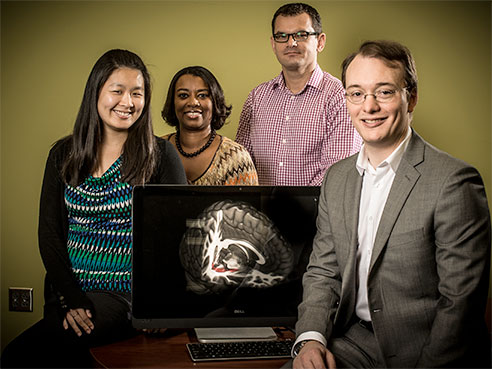 From left: Joanne Linn, Ph.D., postdoctoral fellow; Lisa Smoot, lab manager; Luke Parkitny, Ph.D., postdoctoral fellow; and Jarred Younger, Ph.D., lab director and associate professor of Psychology.Chronic pain and fatigue syndromes that plague individuals are difficult to diagnose and treat. These conditions, which go by names such as fibromyalgia and chronic fatigue syndrome, may affect more than 200,000 individuals in Alabama.
From left: Joanne Linn, Ph.D., postdoctoral fellow; Lisa Smoot, lab manager; Luke Parkitny, Ph.D., postdoctoral fellow; and Jarred Younger, Ph.D., lab director and associate professor of Psychology.Chronic pain and fatigue syndromes that plague individuals are difficult to diagnose and treat. These conditions, which go by names such as fibromyalgia and chronic fatigue syndrome, may affect more than 200,000 individuals in Alabama.Research by a new University of Alabama at Birmingham associate professor reveals the best medicine to end chronic pain and fatigue conditions may be stopping inflammation in the brain.
Jarred Younger, Ph.D., who came to UAB from Stanford University’s School of Medicine, has a primary appointment in the Department of Psychology and secondary appointments in the Department of Anesthesiology and the Division of Clinical Immunology and Rheumatology. His focus is diagnosing and treating neuroinflammatory disorders. Younger’s work at Stanford already yielded new treatments for pain and fatigue, and he is continuing that work at UAB.
“We believe that in many cases when someone is suffering from chronic pain or fatigue, they may be suffering from low-level inflammation in their brain,” Younger said. “We are investigating ways to return the brain to its normal state.”
Younger brings with him two postdoctoral fellows — Joanne Lin, Ph.D., a pharmacist and neuroimaging specialist, and Luke Parkitny, Ph.D., a researcher in chronic pain immunology.
The team uses recently developed technologies in immune testing, neuroimaging and pharmacology to better understand the reasons people develop chronic pain and fatigue. They also are testing new treatments for those disorders.
“In many cases, people suffering from chronic pain or fatigue will find that current treatments are just not effective,” Younger said. “And many treatments are addictive or carry other significant risks. There is, therefore, a great need to develop better treatments.”
With few practitioners who specialize in these types of conditions, patients have fewer options for treatment. In Alabama, there are no clinical research centers that specialize in conditions such as fibromyalgia and chronic fatigue syndrome.
Younger sees an opportunity to create a center in Birmingham that will bring world-class research and medicine together to help prevent and treat these disorders.
“Ultimately, we hope to find objective tests for diagnosis and targets for new treatments so these individuals can get their lives back,” Younger said. “UAB’s growing interest in these conditions should bring hope to many suffering Alabamians.”
Alabama State Senator Slade Blackwell shares this goal. In 2013, Blackwell led the charge to pass a Senate Joint Resolution that urged Gov. Robert Bentley and state health officials to establish a clinical care and research center for these conditions.
“Having a clinical care and research center in Alabama that addresses these diseases will satisfy an unmet patient need in our area,” Blackwell said. “SJR64 was passed to help make that happen; it asks our state government and health-care-industry leaders to increase education about neuroinflammatory disorders and ultimately to work together to create treatment options in our state.”
Younger’s Neuroinflammation, Pain and Fatigue Laboratory will be conducting several research projects in the Birmingham area. The first large study, funded by the National Institutes of Health, will explore chemicals in the blood that may overly sensitize the brain’s immune system, causing pain and fatigue. Younger’s group recently found that an inflammatory chemical released by fat tissue, called leptin, might be involved in chronic pain and fatigue, especially in women.
The laboratory will be recruiting people with several different chronic pain and fatigue conditions, including fibromyalgia, chronic fatigue syndrome, which is also known as myalgic encephalomyelitis, and Gulf War Illness.
If you are interested in learning more about Younger’s work and the lab’s upcoming clinical studies, visit www.psy.uab.edu/younger.